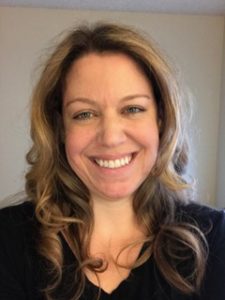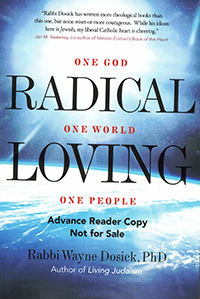Radical Loving: One God, One World, One People by Rabbi Wayne Dosick; Monkfish Book Publishing Company (c) 2021; ISBN 9781948-626279; 234 pages including afterword, acknowledgements, sources and notes; $24.95.
By Heather Z. Rothstain

 IRVINE, California — Radical Loving: One God, One World, One People, written by Rabbi Wayne Dosick, begins with the statement, “What an incredible time it is to be alive!” Immediately the reader is asked to question the author’s opinion “Is it really?” We turn the page and so begins an anecdote of a village of rice growers and how wonderful their lives are. Then in an instant, a terrible storm causes a flood that completely destroys their village and their food supply of rice fields. Thanks to one of the village elders, the people were warned ahead of time and were able to escape to higher elevation and were saved. The anecdote ends of course with a message: “The village and the fields can rise up again. And the villagers can forever tell the tale.” Rabbi Dosick is calling on the world to band together and to not forget that we are “One World, One People” and stronger together. We the readers are the villagers and as my Aunt Nancy has told me, my generation and the next,will be retelling our tale of the 2020 pandemic to our grandchildren for years to come.
IRVINE, California — Radical Loving: One God, One World, One People, written by Rabbi Wayne Dosick, begins with the statement, “What an incredible time it is to be alive!” Immediately the reader is asked to question the author’s opinion “Is it really?” We turn the page and so begins an anecdote of a village of rice growers and how wonderful their lives are. Then in an instant, a terrible storm causes a flood that completely destroys their village and their food supply of rice fields. Thanks to one of the village elders, the people were warned ahead of time and were able to escape to higher elevation and were saved. The anecdote ends of course with a message: “The village and the fields can rise up again. And the villagers can forever tell the tale.” Rabbi Dosick is calling on the world to band together and to not forget that we are “One World, One People” and stronger together. We the readers are the villagers and as my Aunt Nancy has told me, my generation and the next,will be retelling our tale of the 2020 pandemic to our grandchildren for years to come.
From a graphic design perspective, I was immediately drawn to the layout of the text of this book. The design of the chapters makes it inviting to read and breaks down each chapter into smaller stories or calls to action. In my generation, I devour any graphic novel that comes my way because of the combinations of picture and text, so I appreciate the omission of lengthy text minimized to 10-point font.
Rabbi Dosick brings us into his world by his first Chapter “Naming It.” I’m sure many people have had many different, unfathomable and censored names for the year 2020, but the author is also asking us to call out racism and bigotry by naming them. As with any disease, pandemic or the like, we combat something by a call to action by “naming” the problem. A quote by Albert Einstein is mentioned “The world will not be destroyed by those who do evil, but by those who watch them without doing anything.” And this is where Dosick calls us to action and presents us with the overall theme of the book: “These incredibly challenging times call us to nothing less than a radical shift in human consciousness, a radical embrace of a world of oneness.”
Dosick begins with a recount of “In the Beginning,” a brief overview of the Genesis story of creation from the Jewish perspective. Followed by a short retelling of the story of Gan Eden and “the Fall” and how we as humans lost paradise but gained “consciousness” as the story is told. The examples of Cain and Abel, The Tower of Babel, The Great Flood, to name a few, are referenced. We can see that this was the beginning of when things began to fall apart; “when we lost paradise, we lost oneness.” Dosick’s words transport the readers onto a bench sitting next to God. Everything unfolds before our very eyes. We remember everything that has come before us. Have we learned anything? So much pain, bloodshed, anger, tragedy, death, has befallen us. On that bench, God tries to remind us that we are not better than our neighbor, one religion or group is not better than the next, that we are all children of God and that in order to mend our world, and return to the garden of paradise, we must learn to love one another despite our differences. We must work together as one world, one people. For the reader to return to “paradise” or a better world from even before the pandemic; we must put all our differences aside. This is radical thinking!
To be candid, in the middle of reading this book and writing this review, I was distracted by the attack on the US Capitol building. Returning to reading, I realized this is precisely why others need to read this book “right now”. Radical Loving reminds us during these tumultuous times that in order to move forward, we need to come together, as one nation, one people, loving one another regardless of all political affiliations, religious affiliations, class, gender, age or sexual orientation. That is indeed radical! How can this possibly be done? And how?
The author takes us through various chapters that discuss things from loving our neighbor as thyself, to loving our planet and caring for the earth, to having gratitude and joy for what we have, to loving our differences and remembering that we are the same in the eyes of God. Each chapter explores how to love through the lens of Jewish stories and Torah; each chapter includes inspirational quotes from famous rabbis ranging from Reform to Bratslaver Hassidim, from famous Jewish leaders such as Elie Wiesel, and from other faiths as well. Whether the reader is Jewish or not, many things can be learned from Dosick’s book. If you have read other commentary by rabbis or famous Jewish leaders in great depth, then this book may not be right for you as it skims the various topics. That being said, it’s an excellent guidebook and compilation of quotes and anecdotes from famous Jewish leaders and rabbis and other leaders of various faiths on how to love.
Before reading this book I did not know who Rabbi Dosick was, but I later learned that he is one of San Diego County’s longest-serving religious leaders and that before starting the Elijah Minyan in Carlsbad, he had been the rabbi at two Conservative congregations in San Diego: Beth El and Beth Am. In the afterword of his book, he provides insight into some of his political views. He also shares a story of a personal friendship he had with a priest and colleague he knew while teaching at the University of San Diego. I felt I learned a lot about him as a rabbi just from those short chapters and how two people of different faiths can have a healthy friendship. I have not read Dosick’s other books; Living Judaism, for example, but I can only assume that his other books are also about “action” in Judaism and not just ritual. That’s what Radical Loving calls on us to do. Adapt Judaism into our everyday lives, not just in the synagogue. To take action and not just sit on the sidelines. That’s what Judaism is. It’s not a religion of “do as I say, not as I do” it’s through action that we live, we love, we experience God.
Now you might be thinking “what kind of hippie nonsense is this book?” Even if you may have assumptions about Rabbi Dosick’s political stance, he does a pretty good job of being nonpartisan in this book. If you wonder how observant he is as a Jewish religious leader, I ask you to persevere and read this book from cover to end. I myself had assumptions of affiliation but I read to the end. Radical Loving is just that, we need to disregard those things in order to move past them and create progress. All sides need to stop and listen to one another in order to get through this pandemic, re-unite our country and move forward with life, liberty and the pursuit of justice. Name calling won’t get us anywhere. We need to be radical in our approach and try something different. This is not a book to wait on but one to read right now and get us on the right track for the rest of 2021!
*
Heather Z. Rothstain, an art instructor, is a board member of NextGen OC, the young adult department of the Jewish Federation of Orange County, California.